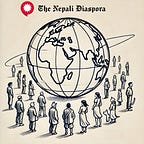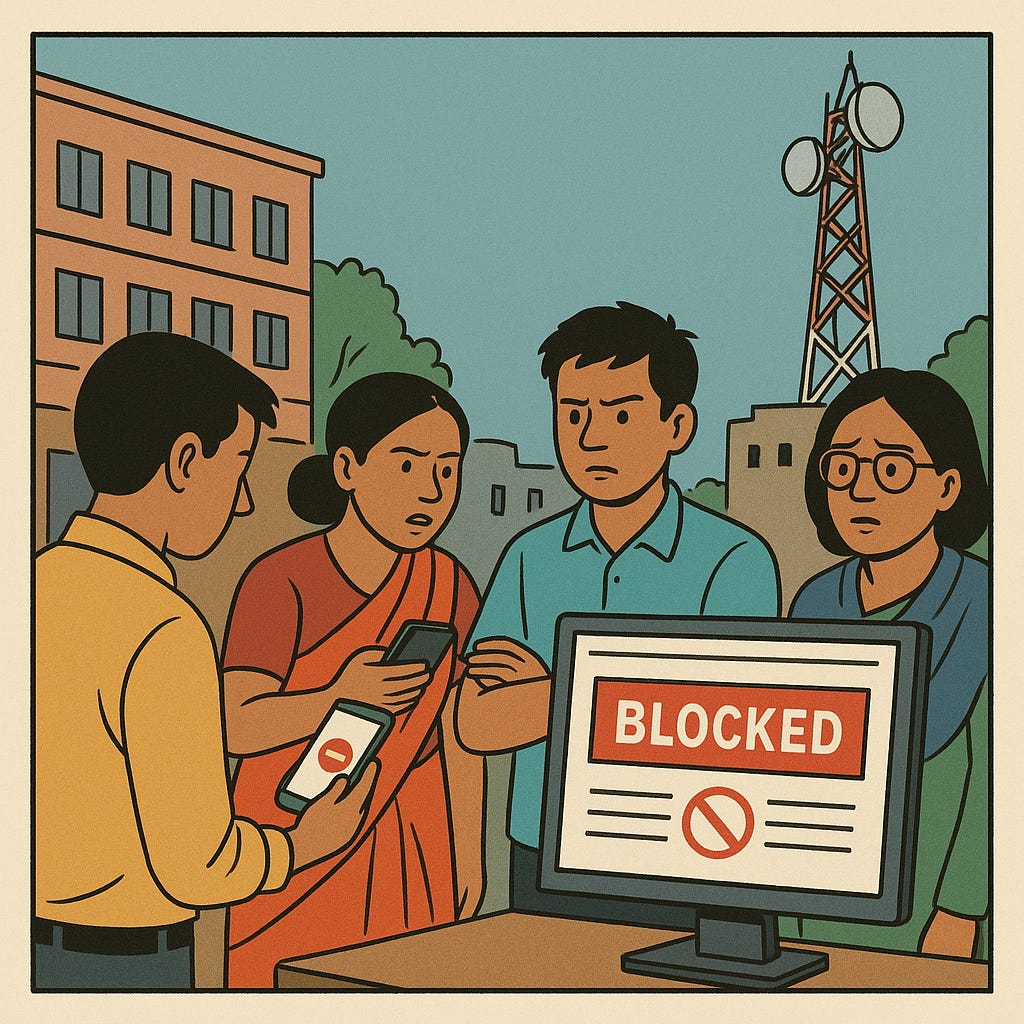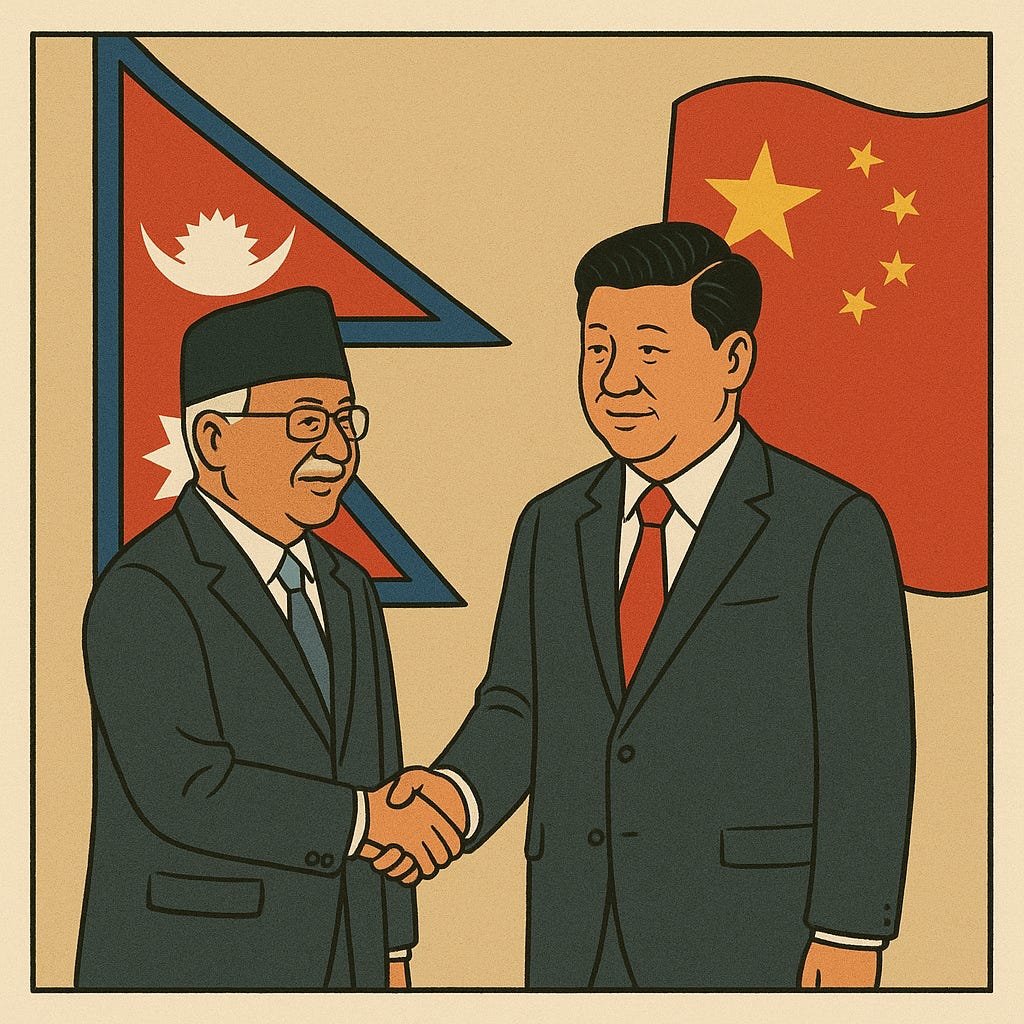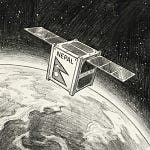Nepal served up a busy week: at home the government moved to block unregistered social platforms while abroad Prime Minister Oli walked a diplomatic tightrope in China—firm on Lipulekh yet eager to turn BRI talk into projects. Tourism is rebounding, US tariffs are nudging Indian garment makers to consider Nepal, a Dailekh gas find offers energy promise even as monsoon landslides highlight climate risk, and steady remittances keep the economy humming—so yes, Nepal is juggling apps, borders and a whiff of natural‑gas optimism.
Share the love! Help others that care about Nepal stay up to date the easy way. If you like this issue, share it with a friend who follows Nepal and hit Subscribe for your weekly dose of curated, can’t-miss updates.
Politics & Governance 🏛️
Confusion and public anger followed the government’s sudden move to block unregistered social platforms after the registration deadline expired. Reporting by KTM Post documents the immediate shock — a published list of 26 apps slated for blocking (from Facebook and WhatsApp to X and YouTube), frantic “last‑post” reactions from users, and Meta reportedly contacting officials to clarify compliance requirements — underscoring how deeply embedded these services are in everyday life and diaspora connections. For millions who rely on these apps to work, study and stay in touch, the move feels abrupt and deeply disruptive.
Technically, the shutdown is being rolled out through the Nepal Telecommunications Authority instructing ISPs and telcos to disable access, a manoeuvre that creates acute short‑term risks for e‑commerce, remittance messaging, remote learning and emergency communications. Coverage by THT and RisingNepal describes ISPs forming technical committees and preparing customer notices, while app stores strained under spikes in downloads for alternatives such as Viber — practical evidence that enforcement hands authorities immediate levers but gives businesses and users little time to adapt.
The government points to recent Supreme Court rulings as legal backing for the action: full‑bench and division‑bench decisions urged mandatory registration, monitoring and accountability for online platforms to curb false identities and “undesirable” content. KTM Post explains the court language regulators cite to justify rapid deactivation of unregistered services. Critics say court directions should lead to clear parliamentary rules and procedural safeguards rather than abrupt administrative shutdowns that risk chilling speech and harming digital rights and livelihoods.
On the foreign‑policy front, Prime Minister KP Sharma Oli’s Tianjin–Beijing visits combined firm political signalling with a push for concrete development outcomes. In a one‑on‑one with President Xi he raised the Lipulekh claim and urged recognition of Nepal’s constitutional map while pressing Beijing to accelerate implementation of previously agreed projects under the Belt & Road framework and to support cooperation on fertiliser, energy exploration and climate resilience — a blend of sovereignty assertion and project‑level bargaining captured by KTM Post and summarised in MyRepublica. The stated aim was to convert summit diplomacy into tangible benefits for people at home.
The trip’s broader slate — bilateral meetings with Vietnam, Cambodia, Laos and the Maldives, site visits (rice‑seed pilots, cultural stops) and a Beijing meeting with Vice‑President Han Zheng — was designed to widen development partnerships while reinforcing political ties, as reported by THT and MyRepublica. But the visit also produced messaging friction — Chinese readouts implying Nepali support for initiatives such as the GSI/GCI/GDI prompted swift Nepali denials and clarifications stressing Nepal’s constitutional commitment to a non‑aligned foreign policy — underscoring that Kathmandu must balance bold diplomatic moves with careful management of domestic perceptions and rights.
Economy & Development 💸
Nepal’s tourism recovery gained momentum in August as international arrivals rose by 22%, totalling 88,680 visitors — a clear sign the sector is rebounding from the pandemic slump, according to the Nepal Tourism Board reported by THT. India remains the dominant source market (35,505 visitors, roughly 40%), followed by China and the United States; arrivals from January–August reached 736,562, underscoring a steady year‑to‑date recovery. The increase has been supported by improved air connectivity (notably new Air India Express services) and targeted marketing, which NTB and industry players say should be used to convert short‑term bounce into sustained growth, as also summarised in MyRepublica.
External shocks are creating unexpected economic openings: Trump’s steep tariffs on Indian and Bangladeshi exports have prompted garment producers and brands in India to eye Nepal as an alternative production base, thanks to Nepal’s comparatively low US tariff exposure (around 10%), industry contacts tell the KTM Post. If some manufacturers relocate or form joint ventures with Nepali firms, the upside could be material — analysts cite potential to multiply exports to the US dramatically — but Kathmandu must guard against illicit transhipment risks, upgrade compliance systems and prepare labour, infrastructure and regulatory support to capture real value rather than become a short‑term conduit for displaced production.
Beyond tourism and trade pivots, development risks and opportunities demand attention. The monsoon season has highlighted an intensifying landslide crisis — rising incident rates, mounting casualties and repeated highway blockages are undermining connectivity and economic resilience across regions, a trend analysed in depth by THT — reinforcing the need for climate‑adaptive infrastructure and early‑warning systems. At the same time, a promising energy development in Dailekh — a preliminary discovery of an estimated 112 billion cubic metres of methane gas — could, if validated and responsibly developed, reduce costly LPG imports, spur local employment and supply feedstock for fertiliser production; initial findings and next steps are being tracked by Kathmandu and reported by the KTM Post. The policy implication is clear: push for fast, tangible investments (tourism services, export competitiveness and energy testing) while investing in disaster‑proof infrastructure and governance to protect those gains.
Diaspora & Globalisation
Nepal’s overseas workforce remains the country’s economic backbone — sending home about Rs 4.72 billion daily (roughly Rs 1.72 trillion over the past fiscal year), a lifeline for families and the broader economy, as reported by MyRepublica. Those inflows now exceed USD 11 billion and account for about 26.6% of GDP, with remittances rising to NPR 1,356.6 billion in FY24/25 (up ~NPR 158 billion), bolstering foreign reserves, household consumption and financial stability. The Gulf — and the UAE in particular — remains a key destination thanks to demand across construction, healthcare and services and to stronger worker protections (wage‑protection, insurance and legal supports) that make migration safer and more productive. Formalisation and fintech advances — including Nepal’s integration with India’s UPI — are lowering costs and speeding transfers, while remittances translate into homes, schools and small businesses across the country (61% of households receive remittances), with women’s transfers especially directed to essentials and education. For the diaspora and policymakers alike, the clear priority is to protect migrants, expand financial inclusion and channel these resources into sustainable investment so that Nepal’s hundreds of thousands of overseas workers — truly the nation’s economic ambassadors — continue to convert hard‑earned earnings into shared development.
Let’s connect
Enjoying this issue? 📩 Share it with a friend & let’s keep Nepalis worldwide in the loop! Got thoughts? Hit reply—we’re all ears! Or let us know what you think via our Feedback form or follow us on Facebook | LinkedIn
P.S. Got a story or issue you'd like us to cover next week? Drop us a reply — we're building this space together.
About Nepali Diaspora Digest:
The Nepali Diaspora Digest connects the global Nepali community with curated news, insights, and stories that matter most. Join us as we celebrate and explore the diverse voices and achievements of Nepalis worldwide.
Partner shout out
belayat.uk: helping Nepalis connect in the UK on jobs, housing, events and finding local Nepali owned businesses

















